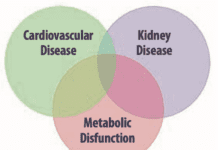Have High Blood Pressure? Healthy Lifestyle Choices Linked to Lower Risk of Death
A study that followed over 14,000 individuals in China with hypertension (high blood pressure) for up to 10 years found that improvement in lifestyle after hypertension diagnosis was associated with significantly lower risk of death. Lifestyle factors included body mass index, smoking status, diet, physical activity, and sleep duration.
For participants with an unfavorable lifestyle (defined by high body mass index, tobacco use, poor dietary pattern, physical inactivity, and inadequate sleep duration), there was no significant reduction in mortality risk even if they were using antihypertensive medication. In contrast, the combination of taking blood pressure medication and improving lifestyle behaviors was associated with the lowest risk of death from any cause, including heart attack, stroke, and cancer. If you have high blood pressure, don’t rely on medication alone. Avoid tobacco products, aim for 150 minutes a week of physical activity, consume a high-quality diet (as recommended in this newsletter), get seven to nine hours of sleep a night, and work to bring your BMI into the 20 to 25 range.
Loneliness Associated with Risk of Cardiovascular Disease in Women
A study of nearly 58,000 postmenopausal women in the U.S. found that greater social isolation and loneliness were associated with higher risk for cardiovascular disease (CVD), even after adjusting for other health indicators. Compared with women who reported less social isolation, women who reported greater isolation had an eight percent higher risk of coronary heart disease, stroke, and death from CVD. Those who reported greater loneliness had a five percent higher risk than those who were less lonely. Women who scored high on both social isolation and loneliness had 13 to 27 percent higher risk of CVD than those who scored low on both measures.
This new study provides more evidence on the importance of finding ways to connect with others for mental and physical health. If you cannot go out, aim to schedule regular calls or video chats with friends or family, take an online class, volunteer to make calls for a charitable organization, or find a virtual book group or similar type group. When going out is an option, make sure you do so. Leverage hobbies, interests, work opportunities, and skills to meet new people, and plan a walk, meal, game night, or other reason to gather with people.
Get Moving After Eating to Keep Blood Sugar Levels in Check
Getting moving after meals may help control blood sugar levels and stave off type 2 diabetes.
To study the effect of moderate intensity physical activity on blood sugar levels, researchers had 30 participants (12 women and 18 men) walk up and down stairs for either one, three, or 10 minutes within 30 minutes of consuming a sugar solution. Blood was drawn to test blood sugar levels, insulin concentrations, and other measures.
Stair walking at a moderate pace for just three minutes was enough to decrease blood sugar and insulin concentrations. After 10 minutes, insulin sensitivity showed significant improvement.
Type 2 diabetes develops over time as the body’s ability to manage blood sugar (glucose) levels decreases. Typically, the cells become less sensitive to insulin, which is needed to move glucose from the bloodstream into the cells. This insulin resistance results in high blood sugar levels after eating. Using your muscles enhances blood glucose uptake.
To help prevent high blood sugar levels after eating, climb up some stairs, take a brisk walk around the block, put on some music and dance, hop on that exercise bike, or engage in any other moderate activity you enjoy for three to 10 minutes after meals.
Middle-Aged and Older Adults May Overuse Supplements

Analysis of data from a survey of individuals aged 50 years and older in the U.S. found almost 85 percent of participants used dietary supplements (including multivitamins, individual vitamin and mineral supplements, and fish oil) daily, averaging three different supplements a day. Nearly 42 percent reported taking four or more supplements daily.
The authors stressed that there is limited evidence that most of these dietary supplements improve health outcomes. Dietary supplements can also interfere with some medications, and high levels of even seemingly harmless vitamins, minerals, and other supplements can have adverse effects. Nutrients from foods are safer and more effective. Unless a supplement has been recommended by your healthcare provider, consider cutting back and focusing on improving your dietary intake.
























